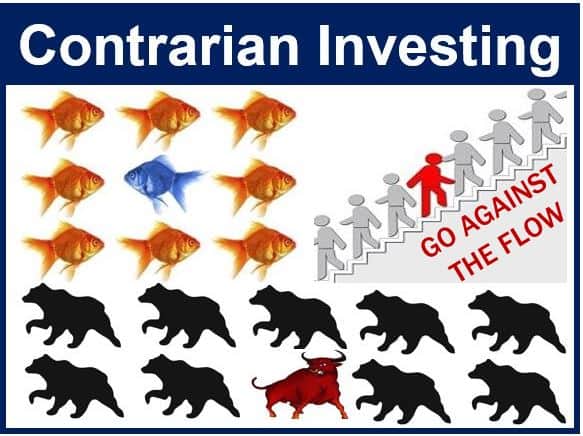Contrarian Investing means going against the flow. In other words, shunning market trends and investment hype. For example, when most people are buying, the contrarian investor is selling, and vice-versa.
Contrarian investors see people jumping into a hot stock as a reason to avoid that stock completely.
Contrarian investors believe that if many people are buying a company’s shares, something bad will happen soon.
For example, they think there will soon be overbuying. If there is overbuying, the shares will stop reflecting the actual strength of the company. Subsequently, the share price will fall.
Contrarian investing also refers to buying stocks when there is widespread pessimism in the market. Contrarian investors think that some very low stocks overstate a company’s risks.
Additionally, if they overstate the risks, they probably understate the company’s chances of making a comeback.
Historically, this strategy has its roots in the earliest stock markets, where astute observers would capitalize on the herd mentality of the majority.

Spotting and buying distressed stocks, and selling them when the business recovers, can lead to strong gains.
We can apply the general principles that the contrarian investor uses to individual stocks or a whole industry sector. In fact, we can even apply it to an entire market.
Contrarian investing – research
To be a successful contrarian investor, you need three things. First, you have to research your market carefully; second, you must be impartial; and third, you need discipline.
Take your time while checking out companies. Look out for a solid management team, good profit margins, efficient processes, and innovative products.
Businesses that can maintain these fundamentals can withstand economic downturns. They can also withstand investor reluctance.
Warren Buffett is arguably the world’s best contrarian investor. He has built a massive fortune by going against popular wisdom. At the height of the financial crisis, he bought Goldman Sachs. According to Forbes.com, Mr. Buffett’s net worth is $124 billion (2023).
Mr. Buffett once said regarding contrarian investing:
“Be fearful when others are greedy and be greedy when others are fearful.”
In some ways, contrarian investing is similar to value investing. It is similar in that the investor is looking for mispriced investments as well as those that are seemingly undervalued by the market.
The contrarian approach often requires nerves of steel to withstand market pressures and investor sentiment.
What is Contrarian Investing?
This educational video, from our sister channel on YouTube – Marketing Business Network, explains what ‘Contrarian Investing’ is using simple and easy-to-understand language and examples.
